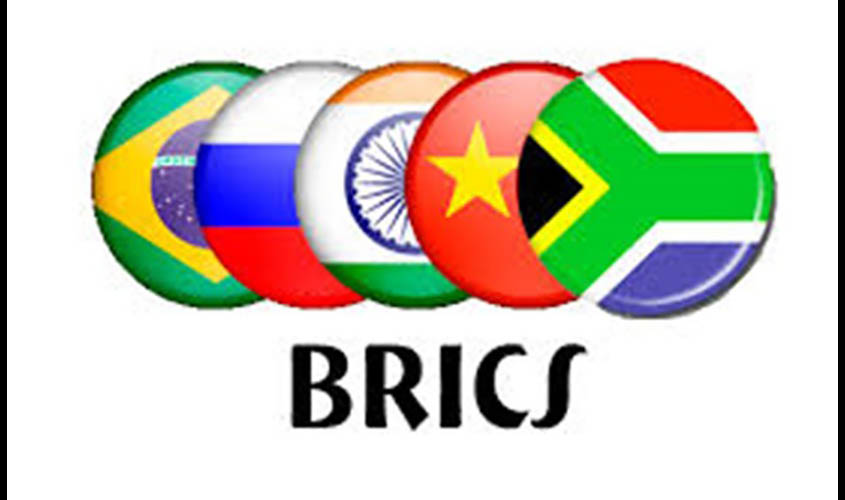In spite of the ongoing world economic slowdown, the BRICS countries—Brazil, Russia, India, China and South Africa—in general and India in particular have performed satisfactorily well in terms of overall growth and development. Hence, the 11th BRICS summit held at Brazil’s capital Brasilia had the theme “Economic Growth for an Innovative Future”. It was mainly to indicate the potential of the BRICS countries and how they could transform the trajectory of the economy of the developing countries. India’s role is becoming significant in this transition.
“India is the world’s most open and investment friendly economy due to political stability, predictable policy and business friendly reforms,” the Prime Minister told the leaders at the Summit and reminded them that “BRICS countries account for 50% of the world’s economic growth”. “Despite the recession in the world, BRICS countries accelerated economic development, brought millions out of poverty and achieved new breakthroughs in technology and innovation,” he added.
The averment that BRICS countries are doing better economically must have pleased the leaders present. But the reality could be far from it. Yet New Delhi has forcefully put its point of view with the hope that India will be able to emerge as an investment destination and the best business partner for BRICS countries.
Such a hope comes close on the heels of New Delhi deciding to opt out of the Regional Comprehensive Economic Partnership (RCEP) at least for the time being and the India-US trade deal not showing signs of going through in the near future.
Interestingly, the Prime Minister had a meeting with Chinese President Xi Jinping on the sidelines of the BRICS Summit in the background of the recent meeting between the two in Mahabalipuram, and afterwards India declined to join RCEP. Among other reasons, India’s mounting trade deficit with China (more than $50 billion) was the main reason to stay out of RCEP. The Finance Ministers of the two major economies in the BRICS grouping are expected to meet soon to sort out differences but trade improvement to India’s advantage seems to be a far cry.
There has been, in the past, some attempts to project BRICS as the sole multilateral forum so as to merge any such existing platforms, especially those that do not have Beijing as a member. India-Brazil-South Africa (IBSA) is one such forum, founded in 2003, which is representative of three democracies in three continents forging a unique and successful economic cooperation. It would be in the best interest of BRICS members to emulate the strengths and advantages of the different but significant democratic practices in these three countries.
New Delhi did not want the BRICS to be a bilateral forum limiting itself to India-China trade and hence proposed wide ranging discussions on improving economic activities, strengthen cooperation in digital commerce, greater cooperation in science and technology related matters and giving a structured fillip to innovation. The MoU between trade and investment promotion agencies in BRICS countries will enhance the free flow of funds and also pave way for a common investment policy to the best advantage of all member countries. The present investment structure is highly skewed in favour of China, needless to say, for very valid reasons. The post Summit meetings of representatives of the BRICS Business Forum could draw a clear roadmap for attracting further investments and correct the anomalies.
The most important aspect of the 11th BRICS Summit was probably the general agreement on India’s proposal to pay attention to the global menace of terrorism, one of the prime reasons for arresting economic growth and prosperity. The urgency to build strong and joint counter-terrorism mechanisms cannot be overlooked. Individual countries can never be sufficiently equipped to improve vigilance and intelligence inputs however strong their resolve or technology may be. At a time when terror outfits have far superior global network and ideological commonality, it is important to have a well established counter-terrorism cooperative framework and protocol to effectively deal with cross border terrorism, intra-country terror financing, misuse of technology and forging steps to counter radicalisation. India’s skills in counter terrorism methods with nil or little collateral damage within the democratic framework would be of great help for the capacity building of other member countries.
There can be no alternative to cooperative and coordinated economic development that seeks to distribute the derivative wealth in an egalitarian manner. In a highly multipolar world, no one country can achieve supreme economic independence at the cost of others in the region and immediate periphery. Such a road to progress will result in regional imbalance leading to collective chaos instead of commonwealth.
The economic growth engines have shifted to the East from the traditional West. This gives enormous opportunities to BRICS members in a rapidly changing geopolitical situation. Old trade blocs are crumbling but new trade armaments are yet to be put in place. It is here that BRICS has an important role to play.
India with its democratic credentials and time tested market mechanisms is on the cusp of a greater benign and balanced leadership role in the future. But such endeavours must be matched with robust domestic economic growth based on sound policies and able administration. The other important strong signalling from BRICS has been against trade unilateralism and protectionism. Cooperation in areas such as investment, trade and technology among BRICS countries will be strengthened to realise their goals for the developing countries.
Prof Arvind Kumar teaches Geopolitics and International Relations at Manipal Academy of Higher Education. Seshadri Chari is a well known political commentator and strategic analyst.

